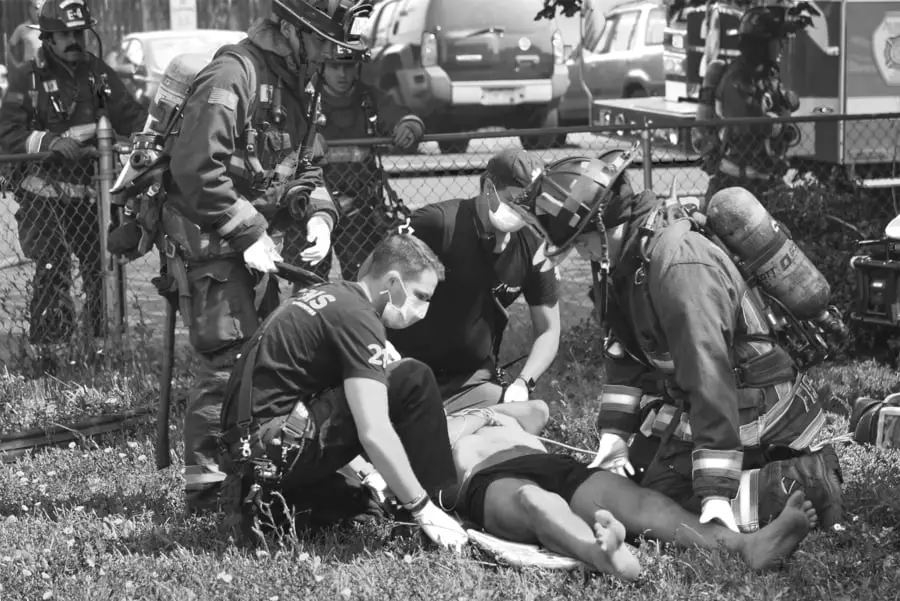An easy acronym to remember while evaluating someone with an altered mental state (AMS) is AEIOU-TIPS. Each letter stands for a potential reason someone may be acting abnormally.
This evaluation is part of a secondary assessment once we are sure that the basic needs are met. See our DRSABCD article for a good starting place for a primary assessment.
What is an Altered Mental State or AMS?
An altered mental state, sometimes referred to as altered mental status, is a change in how our brain is working, which can affect our judgment, orientation, emotions, behavior, and cognitive ability. Causes can range from drug use to a concussion to Alzheimer’s.
How to tell if someone is in an Altered Mental State?
There are two acronyms for assessing someone’s mental status, AVPU and AAO.
AVPU stands for:
- Alert: The patient can answer questions and is awake on their own.
- Verbal: The patient is alert to verbal stimuli. When you shout their name, they open their eyes.
- Pain: The patient is alert to painful stimuli. When you do a sternum rub, the patient opens their eyes or moans.
- Unresponsive: You get no reaction through verbal or painful stimuli.
If the patient is anything but alert on the AVPU scale, they are considered to have an altered level of consciousness. For more information on the AVPU scale, see our article here.
If the patient can answer questions, we should ask the AAO (Alert And Oriented) questions to assess their mental activity.
- Person: Does the patient know their name?
- Place: Does the patient know where they are?
- Time: Does the patient know the day of the week, month, or year?
- Event: Does the patient know why you are there?
If the patient can answer all four of those questions, they are AAO x4. They lose a point for every question they cannot answer and would be considered to have AMS. Some people, like those with dementia, may be altered at their baseline, so having a caretaker or family member can help assess what is typical for those types of patients.
What does AEIOU-TIPS stand for?
- A- Alcohol
- E- Epilepsy
- I- Insulin
- O- Overdose
- U- Uraemia (Renal failure)
- T- Trauma
- I- Infection
- P- Psychosis
- S- Stroke
You have assessed the patient’s mental status and determined that it is altered; now what? It’s time to start thinking of causes.
A- Alcohol
Too much alcohol is a very common cause of AMS. Look for signs of intoxication such as slow and slurred speech, red/watery eyes, an unsteady gait, and the odor of alcohol coming from the person.
E- Epilepsy
Epilepsy is a neurological disorder that causes unprovoked seizures. After seizures, patients will often be altered for a short time, known as a postictal state. Patients with epilepsy sometimes have a medical alert bracelet or neckless stating they have epilepsy. If they are with someone who knows they have a history of seizures, find out how long the patient’s normal postictal phase will last.
I- Insulin
Diabetes and insulin/blood sugar levels can seriously affect our mental state. See our article on diabetic emergencies for more information.
O- Overdose
You can overdose on just about anything, but the most common overdose I have seen is from opioids. Someone experiencing an opioid overdose may be unconscious and have pinpoint pupils, decreased or no respirations, cyanosis around the lips, and pale skin. If you are treating a patient for an opioid overdose, it is crucial to administer Narcan as fast as possible.
U- Uraemia (Renal failure)
Our kidneys are responsible for filtering out waste and balancing electrolytes. People who go into renal failure often require dialysis three times a week to act as a filter outside of the body. When patients miss dialysis appointments, they retain waste, which causes many problems, including AMS. If you think the patient may have renal failure, look for a fistula on the right or left bicep to confirm your suspicions.
T- Trauma
Head injuries and blood loss can cause AMS. A thorough physical exam is crucial when treating someone with AMS. If you think someone is suffering from AMS caused by trauma, constantly reassess their mental status to look for changes.
On a “sick” patient, we should be assessing the mental status every 5-minutes. On a “stable” patient, we should be assessing the mental status every 15-minutes. Any negative change in the patient’s mentation, AVPU or AAO, signals the patient’s condition is worsening, which is essential to know, especially if we do not have vital sign equipment.
I- Infection
A minor untreated infection can quickly escalate into a deadly system-wide infection (sepsis). Someone with a temperature of less than 96.8 or greater than 100.4 degrees Fahrenheit, a respiratory rate greater than 20 breaths per minute, a heart rate greater than 90, a known source of infection, and AMS is considered severely septic. For more information on sepsis in the prehospital setting, click here.
P- Psychosis
Psychosis can be caused by an adverse reaction to medications or mental health disorders. Patients may present in a manic or catatonic state. In either case, thorough history gathering is imperative to determine if the patient’s AMS is caused by psychosis.
S- Stroke
There are two types of strokes hemorrhagic and ischemic. Hemorrhagic strokes are caused by bleeding in the brain, and a blood clot causes ischemic strokes in the brain. If you think someone is having a stroke, then think FAST.
- Facial droop
- Arm drift
- Slurred speech
- Time symptoms started
If someone has one or more of those symptoms, it is a positive indication that they are having a stroke. It is crucial to determine the exact time the patient was last known normal because it may limit the available treatments.
Bonus
If someone presents with AMS, slurred speech, and lack of coordination, they could be intoxicated from alcohol or have low blood sugar. When I treat someone for AMS, regardless of the cause, I always check their blood sugar because it is one of the simplest things we can treat in the field. If you treat someone for hypoglycemia but do not see any improvement in their mentation within about 15-minutes, consider the other causes of AMS listed above.
Final Thoughts
Many conditions can cause AMS in patients. Sometimes it can be hard to find the underlying cause of AMS in the field, but remembering AEIOU-TIPS will give you a great place to start.




